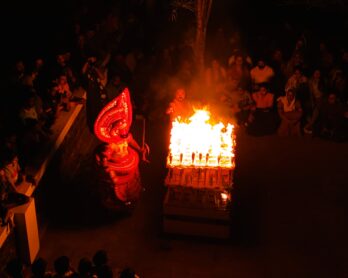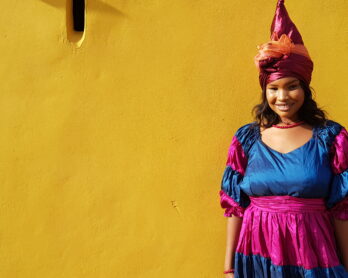“When I invite my girlfriend to an evening in the karaoke bar she is aroused and anguished at the same time,” says Alitt Susanto taking deep drags from a fancy cigarette atomiser. A fruity flavour wafts around us.
“She doesn’t know whether I will be singing about love and longing. Or leaving.” The silver haze is quite atmospheric, something like what Rhett Butler might have stepped out into after the famous ‘Frankly…’ Alitt, a bestselling author and vlogger from Indonesia, cloaked his purple prose of love in celluloid wizardry which won the attention and eventually the affection of his partner. They both travel a lot on work. “And we meet a lot of interesting people on the road.”
“The tables are turned when she takes the mic,” he grins. The atomiser which looks like an oversized Zippo lighter chortles.
More ambiguous smoke.
A lavender wave
The Indonesian love for singing and showcase singing that is karaoke, I was exposed to right when I stepped out of the Jakarta airport. A video screen folded down behind the driver cabin of the luxury bus soon as we began our journey to Sabang. Everybody was taking photographs through the window; those who weren’t taking photographs were shooting videos. Those who had done both were busy editing, readying their next social update. I sat, a muggle, fixated on the screen on which lyrics now appeared. Popular lyrics. From The Boss to Bieber. The words were soon highlighted in a lavender wave that washed over them, disappearing with it. Line. Lavender. Repeat. They scrolled over home shot videos – mostly featuring a single white girl walking barefoot on a beach, doffing her lacey frock for a bikini and walking into the sea regardless of where the song was going. No sound as there was no line out – provided if anybody wanted to sing along as I found later.
“We even have a headphone output for the serious singer,” the driver told me. This allows the singer to listen to the music without outside distractions and not miss a beat.
On that first inroad into Indonesia I sat gawking at lyrics, scrolling and colouring, from pop and blues to jazz and dangdut – local folk with strong influences from Hindustani and Arabic. These are wildly loved for their foot-tapping quality – something like the south Indian dappankuthu but softer and sexier. On retrospect, I might have expected some tourism videos to be played, some message from the concerned minister or a senior pariwisata official – after all we were there on the invite from the Tourism Ministry. Then this was typically Indonesian – no charade, just straight to the heart.
Enrique for dinner
It is Yunita Zahara’s job to know Jakarta like the back of her hand which she does as she works with an international relocation solutions provider. Accompanied by a common friend, we went to a karaoke bar on my second evening in Jakarta. By then I had heard enough to be significantly piqued.
“The youth of Indonesia are under a lot of pressure,” says Valiant Budi Yogi, an award winning author and travel blogger. “Karaoke bars are the cheapest and most fun way of venting all that pent up steam.” He made them sound like the prescription if alexithymia was a medical condition. Or is it? The sombre observation was a marked departure from the usually buoyant Val which in a way spotlighted the undeniable social relevance of karaoke bars. Private roomed – the one which I hired costing 100,000 Rupiah per hour – and single floored bars were not really within reach of the common lot. So enterprising Indonesians started mobile karaoke bars – fitting their cycle rickshaws with sound systems and video screens. The song selection was limited here as they cater largely to the local populace; you can still have your fill of peppy dangdut numbers though.
But at the karaoke bar at the Sarinah Mall which Yunita had found for us we had it all. The console which she held was the key to a staggering musical universe where songs knew no boundaries of language, movie or album, genre or singer. The only thing limiting your access to songs was your knowledge of them. The walls were fitted with lights over which the doctor would spread your medical report and shake his head. The strobe light was after an annoyingly fast spider. But Yunita sang so beautiful that I cried. I took her hands and kissed them. I told her I always wanted to kiss a great singer’s hands. She blamed the Bintangs and said coyly:
“All Indonesians sing very well.”
Which was actually true as I found out later that night. Staggering back to the hotel after three hours at the karaoke bar we were suddenly hungry. We stopped by a roadside food stall exhibiting an array of meat and fish dishes; the dogs and cats lounging about did a better job of entreating passers-by to come in than the proprietors. Hardly had we sat down when two heavily tattooed youngsters appeared and took our jukebox requests. Soft and romantic ballads were belted out with the presence and panache of real rock stars. In Indonesia these folks are called pengamen. You can see them ambling about food markets and generally crowded areas with a guitar and sometimes a drummer companion; 5000 Rupiah for three songs. But you can pay more – these are really gifted guys, strolling Idols. I did. And I hugged them.
And declared them brothers.
The karaoke culture
“It’s a very rare Indonesian who doesn’t sing,” says Indra Widjaya, a popular vlogger who wrote a blockbuster novel about his not making it to the top league in the Indonesian Idol. “In Indonesia we sing not just to convey love but even anger, some simmering resentment or even a way out of an ongoing feud.” Alitt says he has businessmen friends who seals deals with a song. Well, if somebody told me Indonesian mothers censure their kids for not doing homework with a song, I’d believe that by now. It was food, clothes, shelter and song for these guys.
“We grind away all our blues at the karaoke bar,” says Vika Fitriyana, celebrated television anchor. “Whatever your problems there’s nothing which won’t go away if you sing two more songs or dance an hour more.”
“That’s the healing quality of music which you can see at work in the karaoke bars,” says Valiant Budi who is also a songwriter. “Just as much the youth expresses through music they imbibe its sublime powers too.”
Okay, it’s not all singing and dancing at the karaoke bar. Asking for karaoke bars in Bali I had to contend with offers of girls? then, boys? ‘Any type’ and all ages! An American who went native in Jakarta told me about karaoke bars which came at a few thousand dollars per hour which also came with bathycolpian hostesses – who may or may not sing great but whose prowess lay elsewhere. Popular with European and Japanese businessmen these tony joints still keep the age-old reputation of the karaoke bar alive.
Honky tonk blues, to borrow from an old Rolling Stones song.
An edited version of the story appeared in the New Indian Express.



















